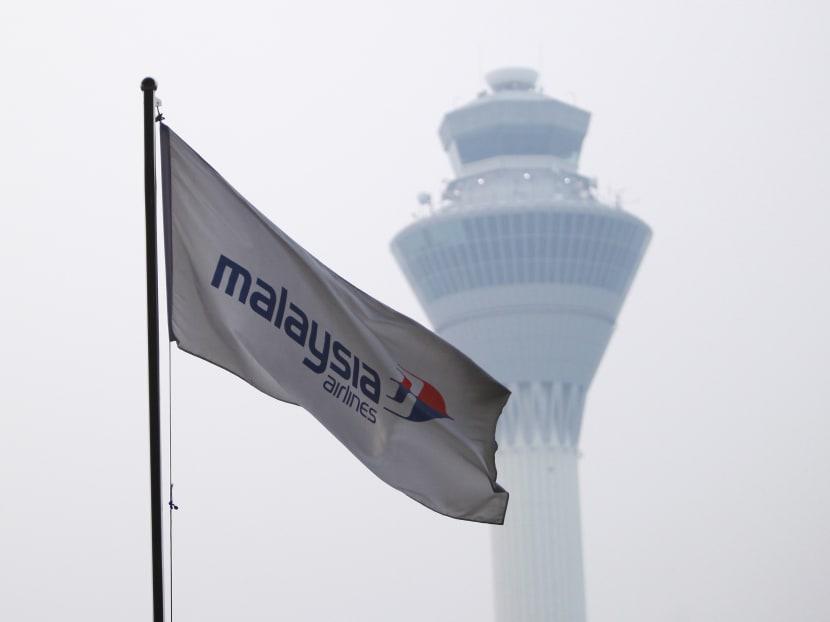KLIA Aeropolis aims to boost M’sia’s standing as ‘vibrant aviation hub’
KUALA LUMPUR – Malaysia on Monday (May 23) launched the 404.7ha KLIA Aeropolis mixed-development project that the authorities hope will set the stage for the country to have its first world-class airport city.

A Malaysia Airlines flag is seen at Kuala Lumpur International Airport. The new KLIA Aeropolis project is seen as a way to enhance Malaysia's reputation as an aviation hub. Photo: Reuters
KUALA LUMPUR – Malaysia on Monday (May 23) launched the 404.7ha KLIA Aeropolis mixed-development project that the authorities hope will set the stage for the country to have its first world-class airport city.
Malaysian Transport Minister Liow Tiong Lai said KLIA Aeropolis, located near the Kuala Lumpur International Airport (KLIA), will generate about RM7 billion (S$2.4 billion) in domestic and foreign investments.
“Undoubtedly, this is a vital project which offers significant positive impact to our nation’s economy,” Malaysian media quoted Mr Liow as saying at the launch of KLIA Aeropolis on Monday.
“On behalf of the government of Malaysia, I would like to commend Malaysia Airports for initiating a project that not only will spur Malaysia’s economic development but also will enhance Malaysia’s reputation in the eyes of the world as a vibrant hub for aviation,” he said, in reference to airport operator Malaysia Airports Holdings Berhad (MAHB), which is the project developer.
The project comes after Singapore announced in 2013 that it will build the S$1.47 billion Jewel Changi Airport mixed-use development. Jewel Changi Airport is scheduled to open in 2018 and will feature 22,000sqm of attractions and 90,000sqm of retail space.
According to the New Straits Times, in line with Malaysia’s objective to be a developed nation by 2020, MAHB is looking to transform KLIA Aeropolis into a world-class airport city as well as being a tourist destination.
Its success will allow MAHB to transform from an infrastructure provider to a key economic enabler by contributing significantly to Malaysia’s gross domestic product (GDP) and to job creation.
National news agency Bernama reported that KLIA Aeropolis will boost Malaysia’s GDP by an estimated RM30 billion and create 56,000 jobs over a period of 15 years. The projection is based on an economic impact analysis by PricewaterhouseCoopers.
KLIA Aeropolis is set to be developed through three clusters, namely air cargo and logistics comprising a land size of 81ha, business and aviation parks (162ha), as well as a 162ha piece of land for meetings, incentives, conferences and events (Mice) and leisure projects.
Among the key projects that would be set up in the airport city include a theme park, hotel, and cargo and logistics park.
“We are very clear in our KLIA Aeropolis development strategy. The clusters identified are synergistic to the larger airport system and will serve to not only benefit the airport operator, but also the aviation supply chain as a whole,” MAHB managing director Badlisham Ghazali was quoted as saying by the New Straits Times.
KLIA handled 48.9 million passengers last year. In contrast, Singapore Changi Airport handled 55.4 million passengers for the same period.
Changi Airport is a leading aviation hub that has won over international travellers and has consistently been honoured as one of the world’s best airports.
It has three terminals, one of which, T1, is currently undergoing expansion. Another passenger terminal, T4, is set to be opened next year while T5 is scheduled to begin operations by the middle of the next decade.
T5 will be a single-standing terminal larger than terminals 2 and 3 combined, with a handling capacity of 50 million passengers per annum when it is ready for operations in the mid-2020s. AGENCIES
Correction: An earlier version of this story said that KLIA Aeropolis will boost Malaysia’s GDP to an estimated RM30 billion and create 56,000 jobs over a period of 15 years. That is incorrect. The KLIA Aeropolis will boost Malaysia’s GDP by an estimated RM30 billion and create 56,000 jobs over a period of 15 years. We apologise for the error.






